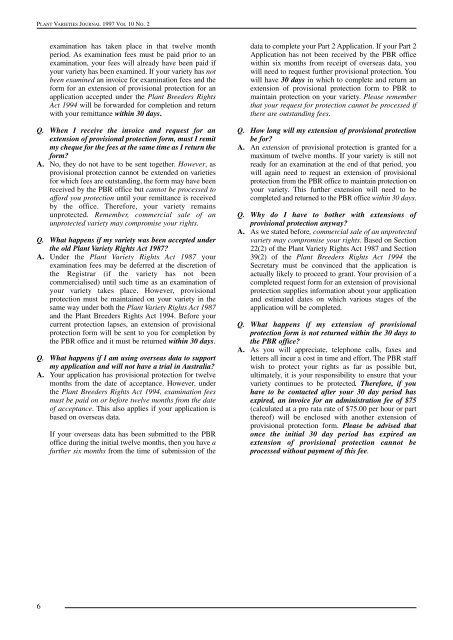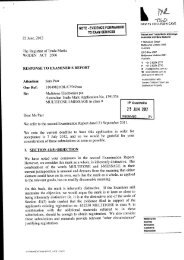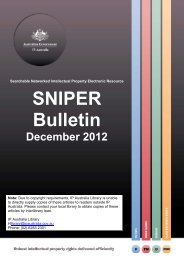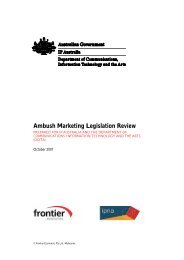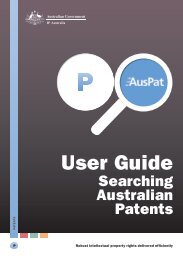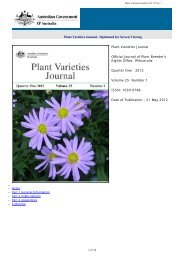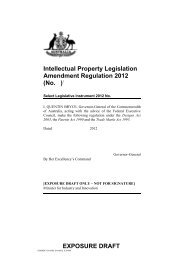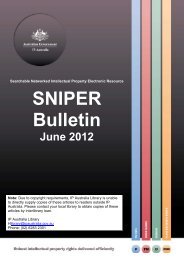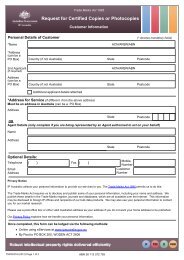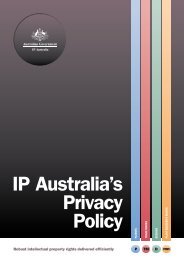64. Volume 10- Number 2 - IP Australia
64. Volume 10- Number 2 - IP Australia
64. Volume 10- Number 2 - IP Australia
You also want an ePaper? Increase the reach of your titles
YUMPU automatically turns print PDFs into web optimized ePapers that Google loves.
PLANT VARIETIES JOURNAL 1997 VOL <strong>10</strong> NO. 2<br />
examination has taken place in that twelve month<br />
period. As examination fees must be paid prior to an<br />
examination, your fees will already have been paid if<br />
your variety has been examined. If your variety has not<br />
been examined an invoice for examination fees and the<br />
form for an extension of provisional protection for an<br />
application accepted under the Plant Breeders Rights<br />
Act 1994 will be forwarded for completion and return<br />
with your remittance within 30 days.<br />
Q. When I receive the invoice and request for an<br />
extension of provisional protection form, must I remit<br />
my cheque for the fees at the same time as I return the<br />
form?<br />
A. No, they do not have to be sent together. However, as<br />
provisional protection cannot be extended on varieties<br />
for which fees are outstanding, the form may have been<br />
received by the PBR office but cannot be processed to<br />
afford you protection until your remittance is received<br />
by the office. Therefore, your variety remains<br />
unprotected. Remember, commercial sale of an<br />
unprotected variety may compromise your rights.<br />
Q. What happens if my variety was been accepted under<br />
the old Plant Variety Rights Act 1987?<br />
A. Under the Plant Variety Rights Act 1987 your<br />
examination fees may be deferred at the discretion of<br />
the Registrar (if the variety has not been<br />
commercialised) until such time as an examination of<br />
your variety takes place. However, provisional<br />
protection must be maintained on your variety in the<br />
same way under both the Plant Variety Rights Act 1987<br />
and the Plant Breeders Rights Act 1994. Before your<br />
current protection lapses, an extension of provisional<br />
protection form will be sent to you for completion by<br />
the PBR office and it must be returned within 30 days.<br />
Q. What happens if I am using overseas data to support<br />
my application and will not have a trial in <strong>Australia</strong>?<br />
A. Your application has provisional protection for twelve<br />
months from the date of acceptance. However, under<br />
the Plant Breeders Rights Act 1994, examination fees<br />
must be paid on or before twelve months from the date<br />
of acceptance. This also applies if your application is<br />
based on overseas data.<br />
If your overseas data has been submitted to the PBR<br />
office during the initial twelve months, then you have a<br />
further six months from the time of submission of the<br />
data to complete your Part 2 Application. If your Part 2<br />
Application has not been received by the PBR office<br />
within six months from receipt of overseas data, you<br />
will need to request further provisional protection. You<br />
will have 30 days in which to complete and return an<br />
extension of provisional protection form to PBR to<br />
maintain protection on your variety. Please remember<br />
that your request for protection cannot be processed if<br />
there are outstanding fees.<br />
Q. How long will my extension of provisional protection<br />
be for?<br />
A. An extension of provisional protection is granted for a<br />
maximum of twelve months. If your variety is still not<br />
ready for an examination at the end of that period, you<br />
will again need to request an extension of provisional<br />
protection from the PBR office to maintain protection on<br />
your variety. This further extension will need to be<br />
completed and returned to the PBR office within 30 days.<br />
Q. Why do I have to bother with extensions of<br />
provisional protection anyway?<br />
A. As we stated before, commercial sale of an unprotected<br />
variety may compromise your rights. Based on Section<br />
22(2) of the Plant Variety Rights Act 1987 and Section<br />
39(2) of the Plant Breeders Rights Act 1994 the<br />
Secretary must be convinced that the application is<br />
actually likely to proceed to grant. Your provision of a<br />
completed request form for an extension of provisional<br />
protection supplies information about your application<br />
and estimated dates on which various stages of the<br />
application will be completed.<br />
Q. What happens if my extension of provisional<br />
protection form is not returned within the 30 days to<br />
the PBR office?<br />
A. As you will appreciate, telephone calls, faxes and<br />
letters all incur a cost in time and effort. The PBR staff<br />
wish to protect your rights as far as possible but,<br />
ultimately, it is your responsibility to ensure that your<br />
variety continues to be protected. Therefore, if you<br />
have to be contacted after your 30 day period has<br />
expired, an invoice for an administration fee of $75<br />
(calculated at a pro rata rate of $75.00 per hour or part<br />
thereof) will be enclosed with another extension of<br />
provisional protection form. Please be advised that<br />
once the initial 30 day period has expired an<br />
extension of provisional protection cannot be<br />
processed without payment of this fee.<br />
6


